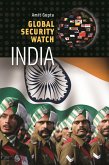This concise introduction to the growth and evolution of geopolitics as a discipline includes biographical information on its leading historical and contemporary practitioners and detailed analysis of its literature.
An important book on a topic that has been neglected for too long, Geopolitics: A Guide to the Issues will provide readers with an enhanced understanding of how geography influences personal, national, and international economics, politics, and security. The work begins with the history of geopolitics from the late 19th century to the present, then discusses the intellectual renaissance the discipline is experiencing today due to the prevalence of international security threats involving territorial, airborne, space-based, and waterborne possession and acquisition.
The book emphasizes current and emerging international geopolitical trends, examining how the U.S. and other countries, including Australia, Brazil, China, India, and Russia, are integrating geopolitics into national security planning. It profiles international geopolitical scholars and their work, and it analyzes emerging academic, military, and governmental literature, including "gray" literature and social networking technologies, such as blogs and Twitter.
An important book on a topic that has been neglected for too long, Geopolitics: A Guide to the Issues will provide readers with an enhanced understanding of how geography influences personal, national, and international economics, politics, and security. The work begins with the history of geopolitics from the late 19th century to the present, then discusses the intellectual renaissance the discipline is experiencing today due to the prevalence of international security threats involving territorial, airborne, space-based, and waterborne possession and acquisition.
The book emphasizes current and emerging international geopolitical trends, examining how the U.S. and other countries, including Australia, Brazil, China, India, and Russia, are integrating geopolitics into national security planning. It profiles international geopolitical scholars and their work, and it analyzes emerging academic, military, and governmental literature, including "gray" literature and social networking technologies, such as blogs and Twitter.









